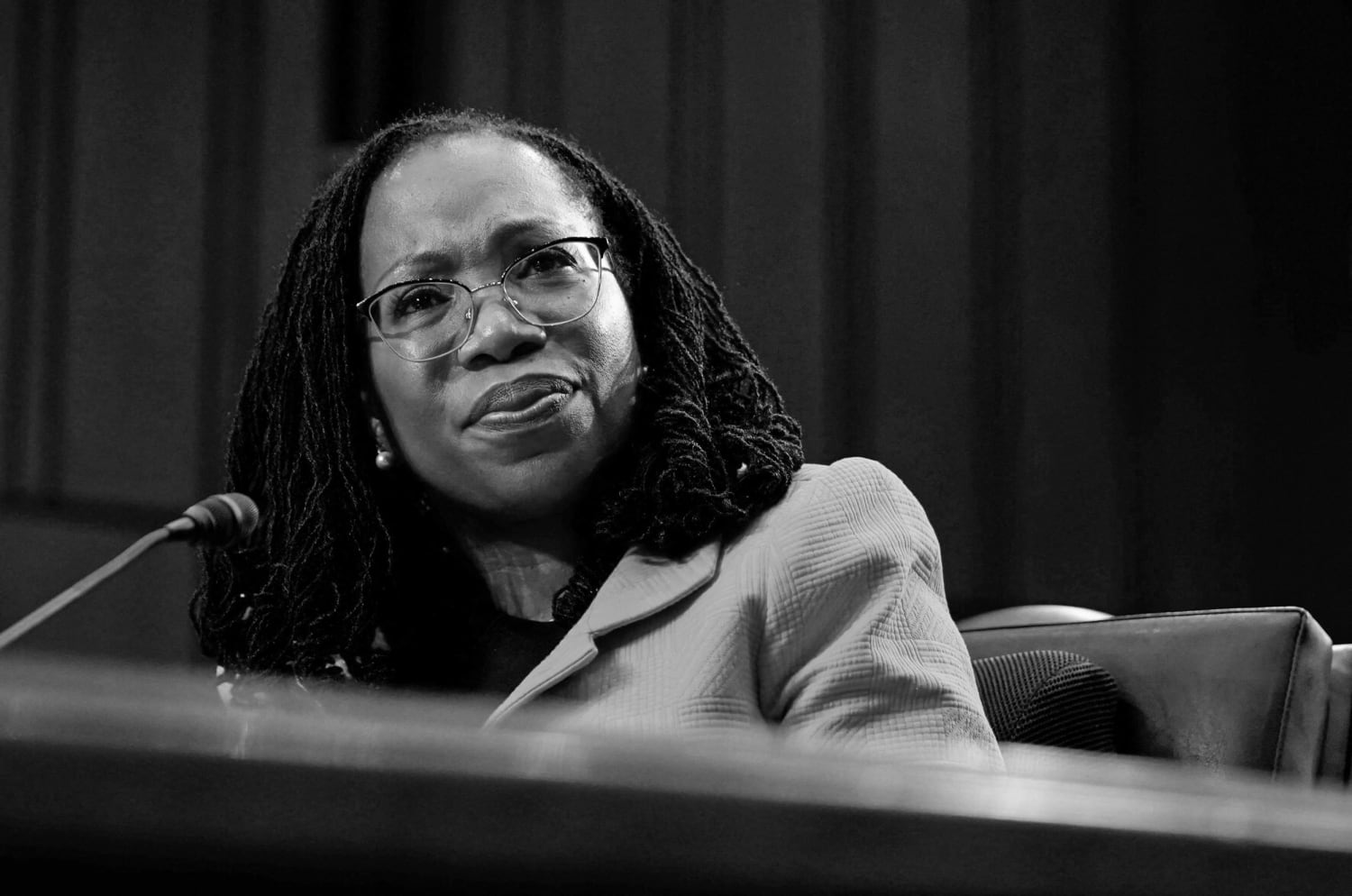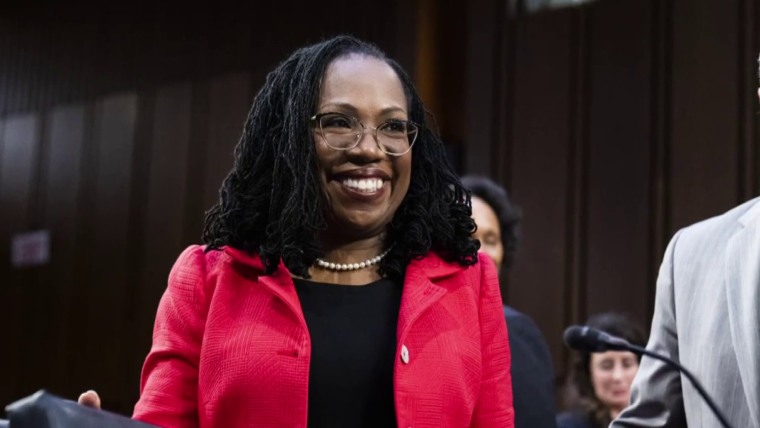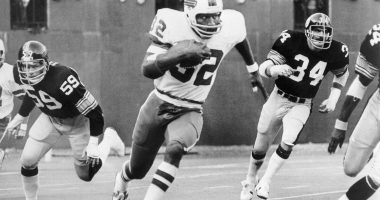This week, Ketanji Brown Jackson became the first Black woman and the first former public defender to stand before the Senate Judiciary Committee as a Supreme Court justice nominee. It’s an occasion for the history books that should be celebrated righteously and full-heartedly. Yet, Black women like me are bracing for impact.
We know all too well the tightrope we walk in predominantly white institutions. One wrong step and our intrinsic value is weaponized against us.
Jackson is an expert in maneuvering around gotcha questions, gaslighting and dog-whistling.
We got a glimpse of that Monday from Sen. Marsha Blackburn, R-Tenn., who suggested that Jackson may have a “hidden agenda,” and went on to claim that Jackson “made clear” that she “believe[s] judges must consider critical race theory when deciding criminal defendants.” Blackburn followed that up with this question: “Is it your personal agenda to incorporate critical race areas into our legal systems?”
This line of questioning continued Tuesday with Sen. Ted Cruz, R-Texas, who in his first opportunity to question the Supreme Court nominee on the public stage interrogated her with blown-up illustrations from author Ibram X. Kendi’s bestselling book “Antiracist Baby” and asked if Jackson believed babies are racist. When pressed by Cruz on critical race theory, Jackson said, “I’ve never studied critical race theory, and I’ve never used it. It doesn’t come up in the work that I do as a judge.”
It appears that Blackburn and Cruz pulled this talking point from a speech Jackson made about federal sentencing in criminal cases. In the speech, Jackson said: “Sentencing is just plain interesting on an intellectual level, in part because it melds together myriad types of law — criminal law, of course, but also administrative law, constitutional law, critical race theory, negotiations and to some extent, even contracts.”
It was clear that she never said that it was a “must” for judges to consider critical race theory but rather one of many philosophies that could be reviewed for sentencing, but her words are being skewed.
For better or worse, this isn’t Jackson’s first rodeo.
At a Senate Judiciary meeting in 2021, Sen. John Cornyn, R-Texas, asked the then-D.C. Circuit nominee, “What role does race play, Judge Jackson, in the kind of judge you have been and the kind of judge you will be?”
In my life, I’ve faced every iteration of this question. Let me translate Cornyn’s real concern: How has your identity as a Black woman shaped your understanding of the legal system in the U.S.? This may seem like a fair question to white people, but to me and other nonwhite people, it’s a smoke and mirrors trick.
The Shakespearean political theater continued to play out Tuesday, with Sen. Lindsey Graham, R-S.C., harping on Jackson’s religious beliefs. It was an attempt to criticize the line of questioning that Democratic senators used during Amy Coney Barrett’s Supreme Court confirmation hearing. But Jackson is an expert in maneuvering around gotcha questions, gaslighting and dog-whistling. On Day 2 of her hearing, she affirmed why we need someone like her to administer justice from the highest court in the land.
Public defenders often face a balancing act. Charged with representing the accused, they gallantly uphold one of the Constitution’s first and foremost promises — to provide defense. However, when we look at who among attorneys is lauded as civil servants, namely with appointments to higher courts, public defenders are nowhere to be found. More often than not, in the selection process, they’re derided for doing exactly as they’re sworn to do — representing the guilty and the innocent alike.
One of the topics that came up Tuesday was Jackson’s time representing Guantanamo Bay detainees after the 9/11 terrorist attacks when she was a federal public defender. She shared an example of her wisdom in this moment. “After 9/11, there were … lawyers who recognized that our nation’s values were under attack, that we couldn’t let the terrorists win by changing who we were, fundamentally. And what that meant was that the people who were being accused by our government of having engaged in actions related to this, under our constitutional scheme were entitled to representation, were entitled to be represented fairly,” she said. “That’s what makes our system the best in the world.”
According to a Center for American Progress report in 2020, only about 1 percent of federal appellate judges worked previously as public defenders or legal aid attorneys. And, according to a Federal Judicial Center database analyzed by the Pew Research Center, only 70 of the 3,843 people who’ve ever served as federal judges in the United States have been Black women.
With trust in the Supreme Court at an all-time low and an ongoing global reckoning with systemic racism, it’s clear: the bench has a profound representation problem, and Jackson offers the unique perspective it most desperately needs.
As a Black woman and a former public defender, Jackson knows what it feels like to navigate a culture and a legal system designed to harm and disenfranchise minorities and low-income people more palpably than any other candidate who has come before her.
If appointees must solemnly swear to do equal right to the poor and to the rich, why then, do we allow elected officials to interrogate Jackson’s personal and professional credentials as if they’re liabilities?
As a client advocate in the Compton Public Defender’s Office, day in and day out, I’m confronted by the institutional barriers that prevent this community from having access to essential resources such as affordable housing, government benefits and health care. As a commissioner in my hometown, this experience could inform my work and provide more insight to tackling issues in my own community, but it can be seen as a risk. I have found that the very mention of race or systemic racism creates divisiveness, incites defensiveness, and makes my peers sit briefly in discomfort. Often, I fear my truth will cast a shadow, in which others pay more attention to my tone rather than the rationality of my argument.
As a Black woman, race is inextricably woven into my everyday life — both personal and professional. People such as Cornyn, Blackburn and Cruz seemingly want you to believe that by admitting that fact, you’re admitting prejudice or culpability, when, in fact, the opposite is true.
Black Americans are incarcerated in state prisons at nearly five times the rate of white people, according to the Sentencing Project. In effect, 1 in 81 Black adults in the U.S. is serving time in state prison. Our criminal legal system is plagued by racism. It’s been proven repeatedly and empirically over the last decade. Given this fact, my Blackness is a certain strength. Where a white legal professional might see stats, I see people. Because, after all, the systemic issues that affect my clients have also affected me.
Jackson’s prolific career as a public defender only bolsters this profound insight. As her confirmation hearing continues, we should expect to see more of her insight on display. When asked by Sen. Dianne Feinstein, D-Calif., about the significance of her nomination, Jackson said that “one of the things that having diverse members of the court does is it provides for the opportunity for role models. Since I was nominated to this position, I have received so many notes and letters and photos from little girls around the country who tell me that they are so excited for this opportunity … because I am a woman, a Black woman.” To take it a step further, Black women who have had to navigate white spaces, particularly in the legal system, are also so excited for this opportunity.
Source: | This article originally belongs to Nbcnews.com











